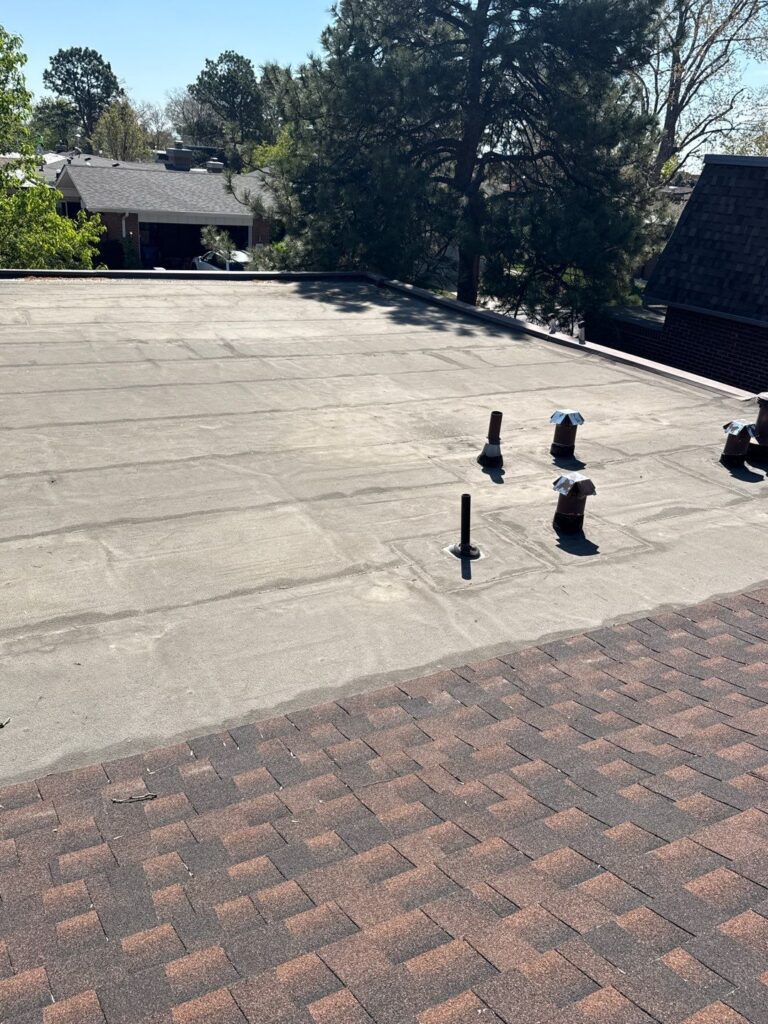
Flat roofs present unique challenges and advantages, especially in a climate like Denver, Colorado. Understanding the best materials, installation practices, and maintenance tips is essential for ensuring a long-lasting and durable roofing system. This comprehensive guide outlines everything homeowners need to know about flat roofs in the region.
Why Flat Roofs Are Common in Denver Homes
Flat roofs are a practical solution for both residential and commercial properties in urban Colorado environments. They offer increased usable space for rooftop amenities, solar panels, or HVAC units and provide a modern architectural appeal. However, flat roofs must be designed with exceptional drainage and material resilience to withstand Denver’s freeze-thaw cycles, snow loads, and UV exposure.
Top Materials for Flat Roofing Systems
TPO Roofing: A Cost-Effective, Energy-Efficient Solution
Thermoplastic Polyolefin (TPO) is a single-ply roofing membrane known for its high reflectivity and energy efficiency. It’s an excellent option for homeowners who want to reduce cooling costs during Colorado’s hot summers. TPO offers exceptional resistance to UV rays, ozone, and chemical damage, ranking it among the most durable materials available for flat roofing systems.
Key Benefits of TPO:
- Reflects UV rays and reduces heat absorption
- Low maintenance requirements
- Puncture and tear-resistant
- Suitable for residential and commercial roofing in Denver
EPDM Roofing: Ideal for Cold Weather Durability
Ethylene Propylene Diene Monomer (EPDM) is a synthetic rubber roofing membrane with proven longevity and performance in variable climates. This material is especially effective in cold environments like Denver, where flexibility is vital for enduring thermal contraction and expansion.
EPDM Highlights:
- Resistant to hail, snow, and extreme temperatures
- Lifespan up to 40 years with proper maintenance
- Simple installation and low repair costs
- Compatible with green roof systems
PVC Roofing: Premium Choice for Chemical Resistance
Polyvinyl Chloride (PVC) is another single-ply membrane favored for its chemical resistance and superior performance in harsh industrial environments. While typically more expensive, PVC roofing delivers outstanding longevity and flame resistance, making it ideal for commercial buildings in Denver requiring premium-grade materials.
Common Flat Roof Issues and Repair Solutions
Identifying and Fixing Leaks
Flat roofs are more prone to water accumulation due to their minimal slope. Leaks often develop around flashing, seams, or ponding water zones. Quick detection and repair are crucial to prevent structural water damage.
Steps to Repair a Flat Roof Leak:
- Identify signs of blistering, cracks, or water pooling.
- Clean the affected area thoroughly.
- Apply a waterproof membrane patch or sealant designed for flat roofs.
- Monitor the area for recurring leaks or moisture intrusion.
Persistent issues may indicate underlying damage, in which case professional assessment is recommended.
Dealing With Ponding Water
Improper drainage leads to ponding, a common cause of membrane deterioration. Installing tapered insulation and improving drain placement can mitigate this risk. Routine roof inspections ensure water runoff systems remain functional year-round.
Lifespan Expectations of Flat Roofing Systems
The durability of flat roofing materials depends heavily on proper installation and periodic maintenance. Here’s what Denver homeowners can expect:
- TPO Roofs: 20–30 years
- EPDM Roofs: Up to 40 years
- PVC Roofs: 25–35 years
Routine inspections, prompt repairs, and seasonal cleanings can significantly extend the roof’s functional life.
Tips for Maintaining Flat Roofs in Colorado
- Seasonal Checks: Inspect the roof each spring and fall for signs of wear, pooling, or punctures.
- Clear Debris: Remove leaves and branches to avoid clogged drains and gutters.
- Professional Inspections: Hire certified roofers in Denver to perform annual maintenance and thermal imaging assessments.
- Snow Removal: Avoid overloading your flat roof with snow; use a roof rake or professional service during heavy snowfalls.
Can You Safely Access a Flat Roof on Foot?
Yes, but with caution. Flat roofs can be accessed for maintenance or inspections. However, using protective walk pads is essential to avoid damaging the membrane. High-traffic roofs should be reinforced accordingly.
Choosing a Trusted Roofing Partner in Denver
Selecting a roofing company in Denver requires attention to experience, certification, and local climate expertise. Tried and True Roofing, based in Denver, Colorado, offers expert flat roof installation and repair services, tailored to withstand Colorado’s challenging weather conditions.
CONCLUSION
Flat roofing systems offer significant advantages for Denver homes, from energy efficiency to design flexibility. Choosing the right material—whether TPO, EPDM, or PVC—and investing in consistent maintenance are the keys to maximizing performance and longevity. With professional guidance from seasoned roofing companies in Denver, homeowners can confidently manage and protect their flat roofing investment.

